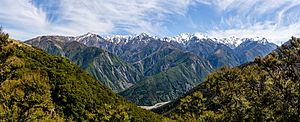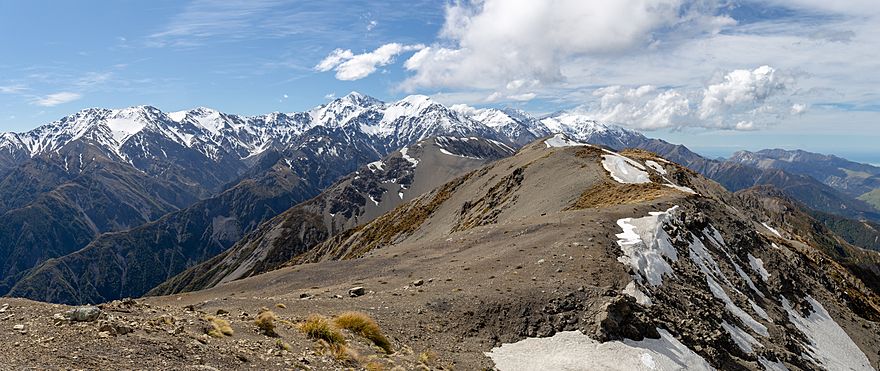Kaikōura Ranges facts for kids
The Kaikōura Ranges are two long lines of mountains in the northeast of New Zealand's South Island. You can see these mountains from far away, even from the southern coast of the North Island.
Contents
What are the Kaikōura Ranges?
These mountains were formed by the Marlborough Fault System, which is a group of cracks in the Earth's crust. They are like the northern end of the famous Southern Alps. Captain James Cook called them the "Looker-on mountains."
Where do the Kaikōura Ranges get their name?
The mountains are named after the town of Kaikōura on the coast. The eastern mountain range, called the Seaward Kaikōuras, starts right from the coast near the town. Its tallest point is Mount Manakau, which is 2,608-metre (8,556 ft) high.
The Inland and Seaward Kaikōuras
The Clarence River flows through a long valley that separates the Seaward Kaikōuras from the Inland Kaikōuras. The Inland Kaikōuras are longer and taller. Their highest peak is Tapuae-o-Uenuku, standing at 2,885-metre (9,465 ft). In the Māori language, its name means "Footprint of the rainbow," which is a beautiful and poetic name.
Beyond the Inland Kaikōuras is another valley where the Awatere River flows. This river runs in the same direction as the Clarence River. The weather in these mountains is usually dry and cold during winter.
Plants of the Kaikōura Ranges
The mountains have areas covered in tussock grass, rocky fields, and large open slopes of loose stones called scree. Most of the lowland forests that used to be here have been cut down. However, the Spencer Range to the south still has many healthy beech forests.
Animals of the Kaikōura Ranges
The Kaikōura Ranges are home to a special place called the Kowhai Valley and Shearwater Stream Important Bird Area. This area is important for birds, especially the Hutton's shearwater, a type of seabird that nests in burrows high in the mountains.
See also
 In Spanish: Cordillera Kaikōura para niños
In Spanish: Cordillera Kaikōura para niños



